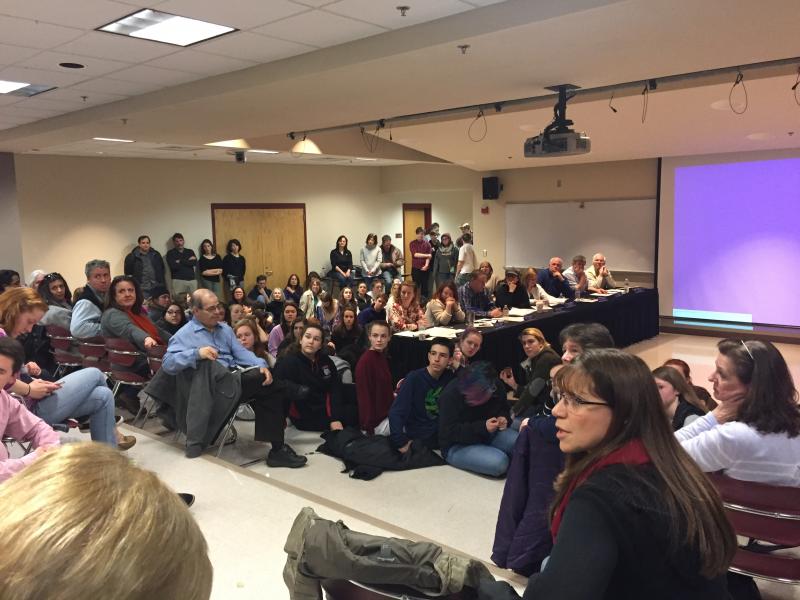School choice prevents staff, program cuts at ORR
More than 100 people came to the Old Rochester Regional budget hearing on Monday night in support of music, technology and art – all areas that were looking at potential staff cuts.
The ORR School Committee proposed and approved a $18,093,215 budget for fiscal year 2018, a $452,242 or 2.56 percent increase above the current year. That number, however, is much less than the committee hoped for. The original budget sent to the three towns had a more than $834,000 increase that was met with a hard “no” from the “town fathers,” said School Committee Chair Tina Rood.
That amount would have preserved all current positions at the junior high and high school while also moving a part-time art teacher to full-time, adding a part-time sign language teacher, special education coordinator, late bus, social worker and guidance counselor. Tri-town leaders, however, said they could only contribute $320,000 more than they did for the current budget. That didn’t go over well.
“This just devastates our school in a way we’re not coming back from in a long time,” said Rood. She said the meeting with officials was a one-sided discussion.
“They were very angry at the fact that our school needed this type of increase,” she said.
One solution was to remove positions in which the teacher plans to leave or retire, namely a technology teacher and the junior high music teacher. An art position would remain part-time instead of moving to full-time.
Instead, the School Committee’s solution was to increase the number of slots available for school choice, a program that allows out of district students to attend a school in exchange for $5,000 each in tuition.
ORR has 68 school choice students this year and agreed to allow a total of 125 next year, a number that the junior high and high school principals say they can accommodate without stressing the system. By doing this, the School Committee said no teaching staff will be cut.
Although town leaders said they couldn’t accommodate the School Committee’s original budget, the towns do pay above their state-mandated assessments. This year, the towns’ total assessments total $14,633,225, including operating costs, capital and debt. By town, the cost is for Marion is $4,431,693, $5,420,566 for Mattapoisett, and $4,780,966 for Rochester.
The schools will also receive an estimated $2,860,000 in state funding, $10,000 from parking fees and $70,000 from the excess and deficiency fund. The later comes from money left over at the end of a budget year.
Overall, Rood said the problem is that ORR's budget will likely be in the same position this time next year.
She encouraged everyone in the audience to speak with Selectmen and Finance Committees.
After the budget presentation, dozens of people spoke up in favor of the programs that were in danger of being cut, including past and present parents, alumni and students.
Speaking about town leaders, one parent said: “Do they not grasp that people move to this town because they have well-rounded students? If we don’t offer that, the tax base in the tri-town is going to be in the trash.”
Chris Berg said the cuts would “completely torpedo the whole school.” He added, “I hope everyone does get on the phone with all our Selectmen and also your Finance Committees.”
Student Elise Parker presented the committee with 200 signatures from students in support of the positions and programs at risk, while an alumni presented an online petition with 332 names and 150 letters of support.
Many also spoke in favor of tri-town music teachers, including retiring junior high teacher Jim Farmer, the high school’s Mike Barnicle and Sippican School’s Hannah Moore.
There was one person in the audience who spoke up for the towns’ leadership. Mattapoisett Selectmen Chair Tyler Macallister said, as a band parent himself, he wants to see the program stay, but he also said the issue wasn’t cut and dry.
With only a 2.5 percent tax increase a year, Mattapoisett only has $565,000 of new revenue this coming fiscal year.
“We can’t spend more than we get,” he said, alluding to last year’s teacher contract negotiations. Macallister said they didn’t take into account limited budget increases.
He also indicated that he was willing to “work the problem.”
While School Committee members were upset about the way the towns handled the budget, member Heather Burke said, “I don’t think they want mediocre schools in these towns.” She said it’s up to townspeople to pay attention and speak up.
“They need to hear that we really are all in it together and we’re not gong to hang them all out to dry,” she said.
After almost three and a half hours, the public discussion closed and it was time for the School Committee to vote on a budget.
James Muse made a motion to approve the $18,093,215 budget proposed. While the committee considered increasing that number, at the recommendation of ORR Business Administrator Patrick Spencer, they decided to vote on the number presented as Selectmen and Finance Committee members would not back a higher budget at Town Meeting.
“If it gets us what we need, then I agree with Patrick and think that’s probably what we have to do,” said Burke.
The committee approved the number, with only Rood opposing it.
“I have to protest,” she said.
Next the budget will go to upcoming Town Meetings for approval.















